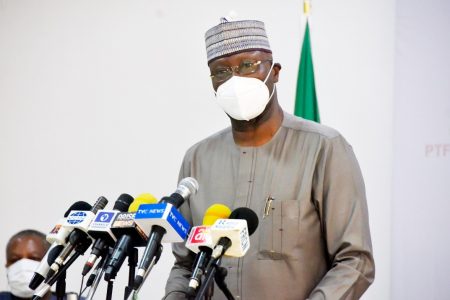
Transporters and commercial drivers have lamented the continued enforcement of the ban on inter-state transit emplaced to curb the spread of COVID-19, saying it has impoverished them, rendered most of their workers jobless and crippled their transport businesses.
This is coming just as the Federal Executive Council (FEC) will on Wednesday consider the reviewed COVID-19 guidelines on transportation.A visit to motor parks across the country capital revealed that some inter-state commercial transporters have been engaging in illegal operations.
But many of the drivers who have chosen to be law abiding wonder how long they will be able to continue living without means of livelihood while depending largely on money made from intra-city operations.
At Okefia Motor Park in Osogbo, the Osun State capital, that used to be a beehive of activities, only intra-city transits are allowed to operate freely.LEADERSHIP findings revealed that interstate transit by commercial transporters still operate in obscure locations across the state capital under heavy hike in transport fare.
One of the drivers in one of the locations, Mufutau Adisa, who spoke to our correspondent, noted that provision must be made in the reviewed guidelines for commuters who must move for important reasons.
Adisa, who attributed the hike in transport fare in such circumstances tothe need to settle security personnel on the road and the bid to divert from major routes to obscure routes that are longer and rough, called for immediate lift of the ban on interstate transit.
The chairman of National Union of Road Transport Workers in Ogo Oluwa Park, Semiu Ademola, pleaded with the government to lift the ban on interstate transit and roll out operational guidelines instead of the ongoing illegal movement without guidelines.
Also, transporters in Ekiti State are bemoaning the loss they incur on a daily basis due to the ban on inter -state travel by the federal and state government, just as they called for a review of the ban.
Speaking with the LEADERSHIP in Ado Ekiti, the state capital, the assistant secretary of National Union of Road Transport Workers (NURTW), Mr Akinluyi Kayode, said while it was good that government introduced the measure to contain the spread of COVID-19 in the state, the prolonged restriction is adversely affecting their source of livelihood.
He said, „ We have no salary, pension or gratuity; this is the only business we depend on to earn income and take care of our families.
“Our members are suffering. We have lost income running into millions
of naira in the last three months due to the ban. We have millions of naira to pay to dealers from whom we purchased our vehicles on credit and we have to pay school fees for our children in school“.
The chairman, Road Transport Employers Association of Nigeria (RTEAN), Ado Ekiti to Lagos Chapel, Adeoye Oladele, said it had been difficult to fend for their families and pay in installment for their vehicles procured on higher purchase.
He said, „We are not earning salaries; this is the only job we have as a source of living. We beg them to lift the ban. This is affecting all our members. “Loss of N100,000 in a week equals N400,000.00 in a month. That amounts to N1.2million in three months“.
He however commended government for the proactive measures against the dreaded COVID-19, saying that the fatality would have been more than what had been recorded so far. He also called for soft loans for the transporters from the government, noting that such would be paid back when the pandemic is over.
Adewole who runs his transport business between Ekiti and Ondo State appealed to the government to lift the ban, but advised that it shouldorder that the number of passengers be reduced for the observation of social and physical distancing.
Also, the chairman of the National Union of Road Transport Workers (NURTW), NTA park in Jos, Plateau State, Alhaji Maikudi Ibrahim said the losses incurred by his members as a result of interstate ban was unquantifiable.
He said although he cannot give the exact figure of their loss, he it is monumental. Ibrahim added that it was unfortunate that the state and federal governments refused to recognise them in terms palliatives like they did for other sector.
He alleged that it was only security agencies that are benefiting from the interstate ban, pointing out that their drivers will pick passengers and drop them at the border, then the passengers will cro ssover by foot and then join another vehicle to their destinations.
Also speaking, a driver with Sharon Bus, Dauda Bala lamented that the inter-state travel ban has brought untold hardship upon them.
In Ilorin, Kwara State, a driver at Maraba Motor Park where vehicles plying Northern route operate from, Malam Amasa Okanla lamented the untold hardship the inter-state travel ban has inflicted on commercial drivers in the state, noting that they can no longer feed their families.
He said they can no longer fend for their families and that no help has come their ways from any quarter. On their part, commuters have also lamented the hike in transport fare as a result of the interstate travel ban.
A commuter simply identified as Sola, a final year student of Ladoke Akintola University of Technology (LAUTECH), said the transport fare from Osogbo to Ogbomoso that used to be N500 now cost N1,000.
She noted that though schools were yet to open officially, her final year project requires moving across states.
In Kogi State, experience of driving from Lokoja, the state capital, to any part of Kogi East, the gateway to South East and South South has soared transport fares.
Sani Sule, a transporter between Anyigba and Lokoja regretted collecting N1,000 instead of the normal N500 from commuters, explaining that the road has deteriorated to the extent that after one trip, motorists have to visit mechanics and vulcanisers to fix their vehicles.
Also, members of Public Transport Owners of Nigeria Association (PTONA) have lamented huge loss of about N200billion to ban on interstate transportation in the country.
With about 10,000 buses parked at various terminals and fleet yards in parts of the country since the ban on inter-state movements took effect as one of the measures to contain the spread of COVID-19, public transport owners have many problems to worry about, including the survival of their businesses.
They said a total of about N200billion which represents the enormous direct and indirect losses immobilizing their vehicles has inflicted on the industry since the first lockdown was announced three months ago.
Worsening this financial setback, they noted, is the uncertainty surrounding when the Presidential Task Force {PTF] on COVID-19 will rescind the prohibition and for how long more it will continue to take a heavy toll on their investments even as domestic airlines count down to the June 21 resumption date with a N27 billion fund as lifeline.
But the severest of the transporters headaches borders on confronting post-lockdown challenges, particularly the task of revamping their already financially encumbered businesses without an inevitable bailout.
Apart from the umbrella association, all the transport firms whose top executive have so far commented on the issue at different times, believe it would be extremely difficult for the investors to recover without the aid of the federal government.
The list of affected companies include ABC Transport, Ifesinachi, E Ekesons, Izu Chukwu Transport, G. U. O Transport, Efex Executive Transport, God is Good Motors, Famous Motors and many others.
Consistent in their comments are the need for PTF to review the ban and the imperative of a special intervention fund from government.
At a recent forum in Lagos, some of the transport owners did not only make a strong case for the immediate unbanning of interstate movements by the PTF, but also called on the task force to introduce the necessary protocols that would enable Nigerians travel safely thereafter.
Lamenting the adverse effects of the lingering prohibition, the national president of the Public Transport Owners of Nigeria Association (PTONA), Isaac Uhunmwagho, appealed for an urgent rescission of the ban and introduction of measures to enhance quick recovery.
Uhunmwagho warned that if the embargo persists it would compound the negative effect on the economy, considering that road transportation accounts for about 90 per cent of movements in the country.
He said road transportation should be accorded as much support as the aviation industry, which is not presently the case.
The PTONA president expressed worry that if the ban is not reversed as soon as possible, the number of small and big businesses that “will die permanently”, will further bring a situation which would have both economic and social implications because of the essential nature of road transportation.
“The transporters are disturbed that thousands of their mini, medium and luxury buses which have been parked for about three months will cost each owner millions of naira to be restored to sound motoring condition before returning to their various routes,” he added.
Considering that the twin facts that the firms are faced with huge un-serviced loans used to purchase the buses and that they have been spending for months without earning, Uhunmwagho, who is the chairman of Efex, contended that adding more commitments to the burden would be too difficult for the transporters to bear.
“Vehicles were never designed to be left idle, and even if they may re-start, numerous mechanical, electrical and system faults are bound to arise, including tyres, and the transport owners have very little funds left to meet up with these challenges. Some transport owners who have rented premises may be unable to continue using some of such premises, he stated.
There is yet another problem, according to Uhunmwagho: “In the post Covid-19 operating conditions, vehicles are expected to carry approximately 50 per cent of passenger as well as spend money on additional sanitation and health facilities. If a vehicle takes 50 per cent of passengers, simple arithmetic will dictate that the transport fare will have to double.
“The airlines have already come up with a similar answer. The question is: can Nigerians, whose average level of income has been adversely hit by the effects of COVID-19 be able to pay significantly increased transport fares?” He queried.
Interestingly, a N27 billion-bailout has just been approved for the domestic aviation industry by the government, a gesture which seems to have further justified the road transporters’ call for palliatives.
The plea for assistance was the thrust of PTONA’s letter some weeks ago to the Economic Sustainability Committee headed by Vice President Yemi Osibanjo.
Signed by Uhunmwagho and the national secretary, Frank Nneji, the letter had requested the approval of a N20billion COVID-19 intervention fund to be disbursed through the Bank of Industry (BOI) to the long distance public transport owners to aid their recovery.
The transport owners also pleaded with the vice president to grant its members special concession on import duties payable on buses by reducing it from 35 per cent to 10 percent as well as direct the Central Bank of Nigeria (CBN) to prevail on all commercial banks to restructure all term loans for businesses mostly affected by the COVID-19 pandemic, especially the interstate passenger transport.
“Government should face the challenge of ensuring that Nigerians comply with the guidelines and protocols which will be introduced for long-distance travels, as well as encourage Nigerians to abide by all other COVID-19 rules and regulations. That is the only way that we can say that we shall overcome COVID-19”, the association said last week in another statement.
Both the president of Association of Luxury Bus Owners (ALBON), an affiliate of PTONA, Prince Emeka Mamah, and the managing director of GUO Transport Company Ltd, Maduabuchi Okeke, in separate interviews, lamented the debilitating effects of the ban, and called for a review and government’s financial assistance to save the industry from collapse.
“It will be very difficult, if not impossible, for inter-state transporters, whose thousands of buses have been locked down for about three months, to recover without incentives, even after the COVID-19 measures have been relaxed,” Mamah argued.
Mamah who is the chairman of Ifesinachi Group drew attention to the response to a similar situation in Britain: “The government of Boris Johnson appreciates the fact that the country depends a lot on road transportation, and so he didn’t starve the owners and their drivers of palliatives. The country has provided about a million pounds for the transporters to maintain their vehicles, including washing and disinfecting them before they are back on the road”.
Remarkably, the bus owners plea for financial aid enjoys a strong support from a Professor of Transport and Logistics Planning in the University of Lagos (UNILAG), Iyiola Oni, who observed that the grounding of interstate vehicles led to some difficulties, hence the request for bailouts to the bus owners, investors and operators.
Oni listed some of the difficulties the transport owners might have been encountering as losing daily returns, inability to repay loans, and getting the grounded buses ready for trips after the ban has been lifted, noting that it would appear that the government was finding it hard to accede to their request for support.
He, however, proffered a solution. He said, Therefore, a more radical economic package, including grants, can be established to keep the existing companies and investors alive. Recapitalising the sector could come with the government requesting commercial banks to grant the investors a three-month moratorium for repayment of loans.
Single-digit loans for restocking replacement parts for their buses, tax holidays, and reduction in the pump prices of petroleum products, were also recommended by Oni as means of alleviating the transporters post lockdown problems.
He explained that because of the importance of road transportation, umbrella unions like PTONA and decision makers should always engage in serious and genuine dialogue” towards finding a solution to problems impeding the former‘s operations.
“Government should enable the official and non-official monetary extortion on the road, as multiple check-points add to the operators costs”, the UNILAG don advised, urging the Federal Ministry of Works and Housing and FERMA (Federal Roads Maintenance Agency) to fix all the major highways across the country in order to ensure that the transporters do not spend a lot of money repairing vehicles damaged by bad roads.
Some of the roads specifically mentioned by Oni are Abuja-Lokoja, Okene-Kabba, Abuja-Kaduna-Kano, Onitsha-Owerri-Aba, Sagamu-Ore-Benin, Abuja-Keffi-Akwanga, Kano-Maiduguri, Lokoja-Benin, and Enugu-Port Harcourt.
FEC Reviews Guidelines Wednesday
Meanwhile, the minister of State for Transportation, Gbemi Saraki, is set to present reviewed guidelines for the lifting of interstate travel ban to the Federal Executive Council for deliberation and approval this week.
The guidelines, if approved, would serve as a yardstick for commuters and passengers to operate when the interstate travel ban is eventually lifted.
Also, the minister of Transportation, Rotimi Amaechi, at the weekend stated that all health protocols must be adhered to when train service resumes.
He said, „We are not in a hurry to start train operations operations because of the danger of COVID-19 spread. When we start, all health and safety protocols must apply. You will not enter a train if you don‘t adhere to our rules.“
SOURCE: | Leadership Newspaper
Kindly contact us @ Naijalivetv@gmail.com
Call or Whatsapp: 07035262029, 07016666694, 08129340000










